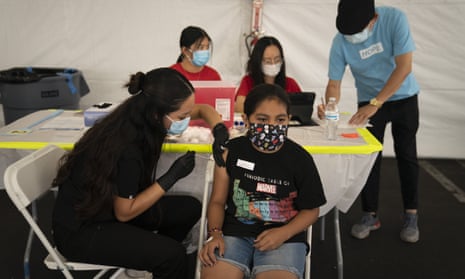Children age five to 11 in the US could soon be able to get a Covid-19 shot at their pediatrician’s office, local pharmacy and potentially even their school, the White House said Wednesday as it detailed plans for the authorization of the Pfizer shot for 28 million younger children across the country.
Federal regulators and independent advisers will meet over the next two weeks to weigh the benefits of giving shots to kids, after lengthy studies meant to ensure the safety and efficacy of the vaccines. Independent advisers to the Food and Drug Administration are expected to begin reviewing the evidence on Pfizer vaccines for younger children early next week.
Within hours of formal approval, expected after the Centers for Disease Control and Prevention (CDC) advisory meeting scheduled for 2-3 November, doses will begin shipping to providers across the country, along with smaller needles necessary for injecting young children, and within days will be ready to go into the arms of kids on a wide scale.
“We know millions of parents have been waiting for Covid-19 vaccine for kids in this age group,” said Jeff Zients, White House Covid-19 response coordinator, said Wednesday. “And should the FDA and CDC authorize the vaccine, we will be ready to get shots in arms.”
The Biden administration notes the nationwide campaign to extend the protection of vaccination to the school-going cohort will not look like the start of the country’s vaccine rollout 10 months ago, when scarcity of doses and capacity problems meant a painstaking wait for many Americans.
The country now has ample supplies of the Pfizer shot to vaccinate the roughly 28 million children who could soon be eligible, White House officials said, and officials have been working for months to ensure widespread availability of shots once approved.
What’s more, vaccine logistics have also improved, with new shipping containers and the ability to store vaccine doses at refrigerator temperatures for up to 10 weeks. Previously, thawed, undiluted vaccine doses could be stored at these temperatures for only five days.
More than 25,000 pediatricians and primary care providers have already signed on to administer Covid-19 vaccine shots tochildren ages five to 11, the White House said, in addition to the tens of thousands of retail pharmacies that are already administering shots to adults and teenagers. Hundreds of school- and community-based clinics will also be funded and supported by the Federal Emergency Management Agency (Fema) to help speed putting shots into arms.
The White House is also preparing to mobilize a stepped-up campaign to educate parents and children about the safety of the shots and the ease of getting them. As has been the case for adult vaccinations, the administration believes trusted messengers – educators, doctors, and community leaders – will be vital to encouraging vaccinations.
While children are at lower risk than older people of having serious side effects from Covid-19, those serious consequences do occur – and officials note that vaccination both dramatically reduces those chances and will reduce the spread of Covid-19, contributing to the nation’s broader recovery from the pandemic.
“Covid has also disrupted our kids’ lives. It’s made school harder, it’s disrupted their ability to see friends and family, it’s made youth sports more challenging,” US surgeon general Dr Vivek Murthy told NBC on Wednesday. “Getting our kids vaccinated, we have the prospect of protecting them, but also getting all of those activities back that are so important to our children.”
Murthy said the administration, which is promoting employer vaccine mandates for adults, is leaving the question of requirements for schools to local and state officials, but called them “reasonable”.
“Those are decisions on, when it comes to school requirements, that are made by localities and by states,” he told NBC’s Today. “You’ve seen already some localities and states talk about vaccine requirements for kids. And I think it’s a reasonable thing to consider to get those vaccination rates high. And it’s also consistent with what we’ve done for other childhood vaccines, like measles, mumps, polio.”
The administration notes that kids who get their first shot within a couple weeks of the expected approval in early November will be fully vaccinated by Christmas.
The US has purchased 65m doses of the Pfizer pediatric shot – expected to be one third the dosage for adults and adolescents – according to officials. They will ship in smaller packages of about 100 doses each, so that more providers can deliver them, and they can be stored for up to 10 weeks at standard refrigeration temperatures.
About 219 million Americans aged 12 and up, or 66% of the total population, have received a Covid-19 shot and nearly 190 million are fully vaccinated.
